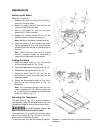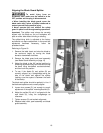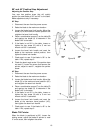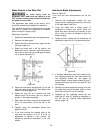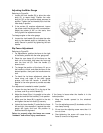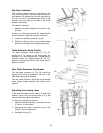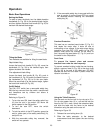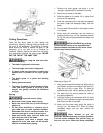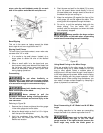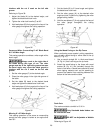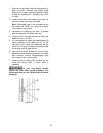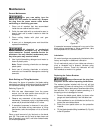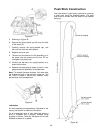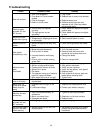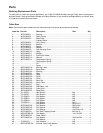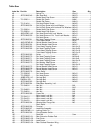
25
stops, raise the anti-kickback pawls (A) on each
side of the splitter and slide the workpiece out.
Figure 35
Bevel Ripping
This cut is the same as ripping except the blade
bevel angle is set to an angle other than “0º.
Ripping Small Pieces
To avoid injury from blade contact, never make cuts
narrower than 1/2 in. wide.
1. It is unsafe to rip small pieces. Instead, rip a
larger piece to obtain the size of the desired
piece.
2. When a small width is to be ripped and your
hand cannot safely pass between the blade and
the rip fence, use one or more push sticks to
move the workpiece. Always use a push stick
during ripping operations.
Crosscutting
Do not allow familiarity or
frequent use of your table saw to cause careless
mistakes. Remember that even a careless fraction
of a second is enough to cause a severe injury.
Keep both hands away from the
blade and the path of the blade.
Never attempt to pull the
workpiece backwards during a cutting operation.
This will cause kickback and serious injury to the
user can occur.
Referring to Figure 36:
1. Remove the rip fence and place the miter gauge
in the miter gauge slot on the table.
2. Adjust the blade height so that it is 1/8 in. higher
than the top of the workpiece.
3. Hold the workpiece firmly against the miter
gauge with the blade path in line with the
desired cut location.
4. Start the saw and wait for the blade (C) to come
up to full speed. Never stand directly in line of
the saw blade path, always stand to the side of
the blade that you are cutting on.
5. Keep the workpiece (B) against the face of the
miter gauge (A) and flat against the table. Then
slowly push the workpiece through the blade.
6. Do not try to pull the workpiece back with the
blade turning. Turn the switch OFF, and
carefully slide the workpiece out when the blade
has completely stopped.
Always position the larger surface
of the work-piece on the table when crosscutting
and/or bevel crosscutting to avoid instability.
Figure 36
Using Wood Facing on the Miter Gauge
Slots are provided in the miter gauge for attaching
an auxiliary facing (A) to make it easier to cut very
long or short pieces. Select a suitable piece of
straight wood, drill two holes through it and attach it
to the miter gauge with screws. Make sure the facing
does not interfere with the proper operation of the
sawblade guard. When cutting long workpieces, you
can make a simple outfeed support by clamping a
piece of plywood to a sawhorse.
Figure 37
Bevel Crosscutting 0°~45° Blade Level & 90° Miter
Angle
This cutting operation is the same as crosscutting
except the blade is at a bevel angle other than 0°.
Always work to the right side of
the blade during this type of cut. The miter
gauge must be in the right side slot because the
bevel angle may cause the blade guard to



